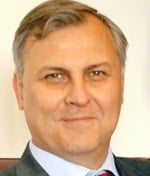– Mr. Ambassador, the day of Europe was celebrated on May 9. This celebration is very interesting especially due to Europe’s ongoing enlargement tendencies. On the other hand, currently there are opinions, according to which the EU is not stabile. Do you think that Europe is faced with such challenges now?
– The Day of Europe symbolizes the ways, through which the EU helps to overcome the wall within Europe. The European enlargement is one of our most successful policies. In 1957 the European Union had only 6 members, and now it has 27 members. During the past 50 years the EU has demonstrated a growing unity and cooperation. The import of a common currency Euro was the best example. Of course the world crisis affected Europe too but currently the EU is making efforts to recover the financial stability and protect Euro.
– One year ago on May 7 the Eastern partnership project was officially launched in Prague. Looking back to the past one year, how do you estimate this project? What do you think about this project and cooperation with Armenia?
– The Eastern partnership project is built based on the Neighborhood Policy and enables the partner countries such as Armenia to approach the European Union as much as they want. A lot of meetings have taken place during the past year. The platform of communication is rather large and it provides opportunities for different sectors starting from civil society members and ending up with customs officials. During this time the EU advisory group in Armenia has supported Armenia to get prepared for the implementation of the next steps connected with the negotiations on the associated agreement with the EU and agreement on a free trade zone. Armenia shall be provided with larger financial resources for this purpose.
– The successful implementation of the Eastern partnership project in fact will result in signing an agreement on associated membership with the EU, which has been said by different high rank officials before too. According to your opinion, when can Armenia have such opportunity?
– In the beginning of May the EU council of ministers came to an agreement on the issues connected with negotiations on the associated agreements with each of the three countries of Caucasus. The negotiations on the associated agreement and agreement on common trade will start just after Armenia finishes the preparation works. Armenia has already formed coordination bodies for the negotiations. These will concern the adoption of the EU rules in different sectors, including the sectors of security of food and goods. As the experience with other partners shows, the negotiations take some time.

